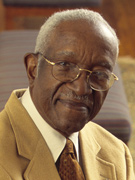 Duke University has announced that it has acquired a vast archive of papers of John Hope Franklin. Professor Franklin was the James B. Duke Professor Emeritus of History at Duke University and one of the most prolific and respected historians of the twentieth century. He died of congestive heart failure on March 25, 2009 at Duke University Hospital. He was 94 years old.
Duke University has announced that it has acquired a vast archive of papers of John Hope Franklin. Professor Franklin was the James B. Duke Professor Emeritus of History at Duke University and one of the most prolific and respected historians of the twentieth century. He died of congestive heart failure on March 25, 2009 at Duke University Hospital. He was 94 years old.
The archive includes more than 300 boxes of materials that were donated to the university by his son and daughter-in-law. Included in the archive are diaries, correspondence, manuscripts, drafts of speeches, photographs, and video recordings. The collection will be housed at the David M. Rubenstein Rare Book and Manuscript Library at Duke. The collection will be made available to researchers once it has been preserved and cataloged.
John Hope Franklin was born in Rentiesville, Oklahoma, in 1915. His grandfather had been a slave. His father was one of the first black lawyers in Oklahoma. His mother was a schoolteacher. Franklin was named after John Hope, the former president of Morehouse College and Atlanta University.
Franklin attended racially segregated schools in Oklahoma. He was valedictorian of his high school class. He wanted to attend the University of Oklahoma but at that time, and for many years later, the state’s flagship university was closed to blacks.
In 1931 Franklin enrolled at Fisk University in Nashville, Tennessee, with the intention of studying law. However, at Fisk, Franklin became a history buff under the mentorship of white professor Theodore Currier. After Franklin graduated from Fisk, Currier lent him the money to pay for graduate study at Harvard University. Franklin earned his master’s degree in 1936 and his doctorate five years later in 1941.
After completing his dissertation, Franklin taught at the North Carolina College for Negroes, now known as North Carolina Central University in Durham. In 1947 Franklin was named to the faculty at Howard University in Washington, D.C. While there he worked with Thurgood Marshall and the NAACP Legal Defense Fund working on briefs for cases that included Brown v. Board of Education.
In 1956 John Hope Franklin landed a teaching position at a predominantly white educational institution. He was hired to chair the department of history at Brooklyn College in New York.
In 1964 Franklin was hired to the faculty at the University of Chicago. He remained there for 16 years before accepting a position at Duke. He later spent seven years on the faculty of Duke Law School. He retired from teaching in 1992.
His seminal work, From Slavery to Freedom: A History of Negro Americans, originally published in 1947, is still in print and is widely assigned in college history courses nationwide. More than 3.5 million copies of the book have been sold.











Two summers ago I was in Nashville and got to visit Fisk University. There is a large section of the library dedicated to Dr. Franklin, one of my heroes in the professorate. It would have been nice if Fisk could have gotten those papers.